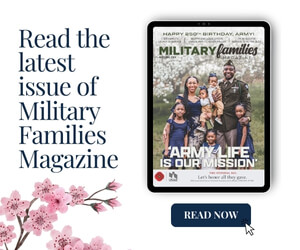Advocating for military spouses is not limited to the highest levels of government; community groups, social media activity and individual participation have taken shape as tools for modern-day advocacy.
Ongoing efforts for and by spouses reveal the increasing importance this role has taken on in recent times as the community continues to face a myriad of issues. For those with a passion for a specific area, experts share tangible options for engagement through multiple fronts.
Join local community groups

When Verenice Castillo began helping new Air Force spouses in 2011, she had no idea that nine years later she would be the founder and CEO of the Military Spouse Advocacy Network. She started slowly by offering programs dedicated to helping those at the squadron level.
“Other squadrons heard about it and wanted to do the same. Out of that, people contacted me and I realized I couldn’t do it on my own. I brought in other Air Force spouses. And it then grew to other [military] branches.”
What started as helping a few individuals spread to an Air Force-sponsored outreach that introduces new recruits and their spouses to the realities of military life.
Oftentimes, change comes from advocates who have high rank or loud voices. MSAN focuses on the most junior spouses and military members.
“We need to advocate for them as well,” Castillo said. “We are essentially welcoming the next chief of staff and their spouse on day one. [If] we can provide a strong foundation from day one, can you imagine what they can accomplish?”
The actions of one person spread because there was a need and others stepped up in support.

Get social
The military spouse community is not what it was 20 years ago. Spouses no longer expect their neighbors to deliver a homemade casserole with a side of community gouge. Both official and unofficial social media groups serve as virtual coffee tables over which to share communal knowledge. Babysitters, military discounts, housing questions, best date-night restaurants and more can all be accessed by virtually meeting hundreds of other spouses from the comfort of one’s current duty station.
“I fell into being a blogger. I didn’t really know the military lifestyle and didn’t know anyone who had experienced that,” said Joanna Guldin-Noll, founder of Jo, My Gosh!, a popular military blog. “I went online to find information because I was in Baltimore and was a girlfriend and later, fiancée. I wasn’t a part of spouse groups or anything. I found message boards and read blogs.”
Guldin-Noll began by posting about care packages she made for her husband and things went viral from there. Today her blog reaches over 200,000, and she is not alone. There are hundreds, if not thousands, of military spouse-related blogs.
In 2015, she joined other military spouse influencers, JD Collins and Lauren Tamm, to leverage their real-life experiences and virtual presence to write “Modern Military Spouse: The Ultimate Military Life Guide for New Spouses and Significant Others.” By bridging beyond their blogs, those military spouses created virtual communities that provide resources 24/7.
Guldin-Noll continued, “Whenever you are writing based on your experiences in a memoir, blog post or opinion piece, you are sharing your story and that is its own form of advocacy.”
Blogging may be the next big form of advocacy, reaching diverse communities in an economic and immediate manner.
One person can make a difference
There is a temptation for people to think their individual contribution doesn’t matter, or that their efforts to cook a meal for a new neighbor or volunteer with their local spouse club will go unnoticed. As indicated by numerous surveys, though, military lifestyle satisfaction is linked to community support.
The Military Family Advisory Network’s “Military Family Support Survey 2017” states, “when respondents described the support they most appreciate, family, friends and faith-based communities rose to the top. When they described the support they needed, they called for more networking, communication and support groups.”
Politicians are listening as proof by congressmen, like Sen. Tim Kaine, introducing the “Jobs and Childcare for Military Families Act of 2019.” Federal funds are flowing, as all branches of service are now supporting military spouse education through the 2019 updates to licensure certification reimbursements. Nonprofit organizations, like the National Military Family Association, are fighting for safe living conditions for military members living in privatized housing.
Therefore, it’s time an individual also takes steps to capitalize on the military spouse support momentum. Grassroots advocacy can start with steps like:
-
Reading about the benefits and challenges facing the spouse community.
-
Following blogs, podcasts, advocacy organizations and military spouse influencers that are inspiring.
-
Emailing or calling local representatives or a military advocacy group about concerning issues.
-
Running for office or supporting someone who is already fighting for worthwhile causes.
Many well-intentioned advocates fail to see success when their focus is the problem. Effective advocates must present thoughtful solutions born out of educated insights, not just constructive criticism.
Joyce Raezer, former executive director of NMFA, emphasizes the importance individual military families have in this process.
“The key to successful advocacy is to never accept the first no,” she said. “If it’s important to you, fight for it. You don’t have to do it alone. [Let’s] tell our stories and work together.”
Read comments













































